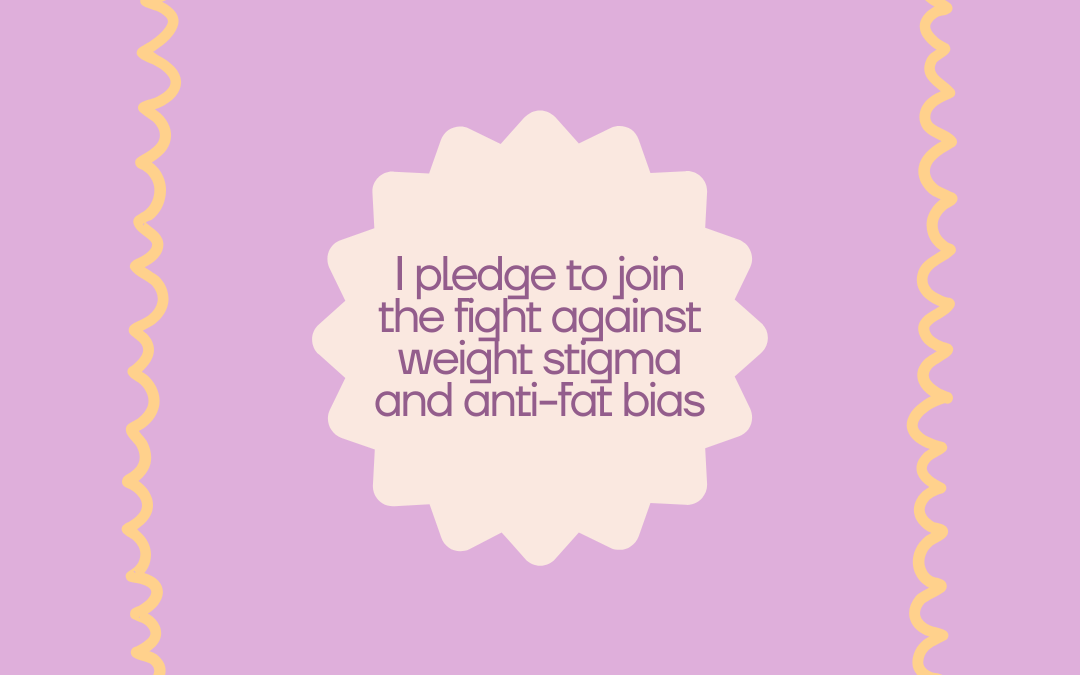Weight bias and stigma are rooted in common misperceptions about weight that have been perpetuated in the public domain for generations. According to a 2021 study, more than 40% of U.S. adults, across a range of body sizes—and even greater numbers abroad—report experiencing weight stigma at some point in their life. Keep reading to learn about why awareness about weight stigma is so important.
Weight Stigma In Popular Culture
We can all see that fashion and entertainment industries are awash with anti-fat biased messaging, from not having examples of different body shapes for consumers of fashion, to tropes of the fat character as side-kick or comic relief. As a culture we can do better! This can be achieved by consuming media that leave caricatures of fatness in the past, and provide quality media that supports images of all body types, depicted with depth, intelligence, and dignity.
Weight Stigma In Healthcare
A less visible issue is weight bias found in healthcare. Activist and author Aubrey Gordon recalls going to a doctor and having her blood pressure checked three times—because the provider couldn’t believe it was normal, given the fact that she’s overweight. This was one in a series of experiences in which her body size was so distracting to the medical provider that she didn’t even get a chance to discuss her reason, as the patient, for seeking care that day. Her story is echoed across the research landscape focused on weight stigma in healthcare. This bias and stigma creates mistrust and results in patients avoiding the doctor’s office.
Psychologist and researcher Stephanie Fitzpatrick believes that subtle change in medical training can shift this dynamic, by encouraging medical trainees to be aware of their own bias, drop generalizing tactics and instead, “take a step back when trying to apply knowledge about obesity and chronic conditions to the patient who’s right in front of you.”
Weight Stigma at Work
“Weight discrimination in employment has been documented for several decades, so this is not a new problem,” explains Rebecca Puhl, a professor at the University of Connecticut and deputy director of the university’s Rudd Center for Food Policy and Health. From wellness initiatives aimed at weight loss, HR not responding to complaints about jokes and taunting by co-workers and admitted bias in hiring, (11% percent of HR professionals say an applicant’s weight has played a role in decisions their organizations have made during the job application process) the workplace is a space where many suffer in silence.
Forward thinking employers are leading the charge in educating their teams about the harmful nature of anti-fat bias and shaming. This effort, combined with adding language around weight diversity to handbooks alongside other unacceptable forms of discrimination (race, age, religion, sexual orientation) are important next steps in reducing the harm of weight discrimination in the workplace.
Weight Stigma At Home
In the United States, diet culture has had a firm hold on the public consciousness since the late 1800s where the Gibson Girl body type was idealized and held on through flapper culture in the 20s. Diet pills and smoking were advertised as safe ways to lose weight from the 40s-the 60s. The list could go on.
Since that time, generation after generation have been programmed to believe thin bodies are synonymous with “health” whereas fat bodies have become associated with morbidity, laziness, and a lack of discipline or willpower to reduce food intake and therefore body size. This coupled with medical bias leads many well-meaning family members to stigmatize those they love, believing that thinness is synonymous with health, success and happiness.
“This is a unique thing about weight stigma” states AJ Tomiyama, professor of Health Psychology at UCLA, “the people who are closest to you and should be the sources of social support are often the ones who are most stigmatizing.” Changes in this area will require a new generation with new language to shine a light on how detrimental holding on to misconceptions about weight impact us all.
Shifting the Narrative on Misconceptions
Self-Education and sharing with family and friends are ways to combat this stigma. Resources provided co-hosts of 2024’s Weight Stigma Awareness Week are well researched and are a great place to start.
Weight Stigma Awareness Week 2024 – Join the conversation
For Weight Stigma Awareness week, The Body Equity Alliance and Within Health are hosting a full week of deep conversations, action planning, and community building . Sign up to join the virtual events!
Looking for Size-Inclusive Nutrition Support? Contact Us!
Courage to Nourish is a group of body positive eating disorder specialized dietitians. We have in person locations in Alexandria, Virginia, Columbia, Maryland and College Park, Maryland. We offer virtual services across the state of Virginia, Washington DC, Pennsylvania, and Colorado. We offer individual nutrition therapy. As well as support groups. We would love to guide you in building a better relationship with food.
Contact us for more information. And to schedule a discovery call. Also, sign up for our client or clinician newsletter!
Take one of our eating disorder quizzes:

